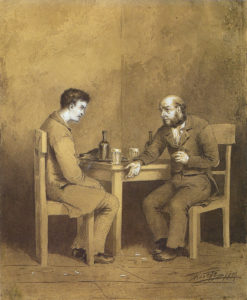I remember when I first read Crime and Punishment, as a student in the early 1990s. The novel seemed to take over my life: I immersed myself in reading it almost to the exclusion of my other studies, because it felt like I couldn’t argue with it, it left me no choice. Whenever I left my room, I felt hunted and kept looking over my shoulder, and the world around me seemed bleak and ugly.
Raskolnikov too finds his world bleak and ugly, and as he moves towards committing his crime, he feels increasingly like he has no choice. Events, like the urgency of his sister’s impending marriage, the fortuitous discovery of when the pawnbroker will be home alone, arrange themselves to suggest he is fated to carry out his murder, until he feels as if his clothes have got caught in the flywheel of a machine and he is being pulled inexorably into it (Chapter 6).
But though he is keenly aware of signs which seem to impel him towards murder, he is less aware of the alternatives that present themselves to him. Without thinking, almost without noticing, he commits two acts of charity: firstly towards the Marmeladov family (Chapter 2) , and secondly towards the vulnerable girl on the street (Chapter 4). He has a choice of how to respond to the ugly, fragmenting society, involving compassion rather than violence. Raskolnikov dismisses these moments as taking the wrong, indeed an irrational, decision – but at least he recognizes his freedom of choice in these moments. On the other hand, he justifies his impending crime as a removal of his free will.
Many critics and commentators discuss why it is important to read Dostoevsky today. For me personally, perhaps his value is to remind us that we cannot say we do not have a choice.
